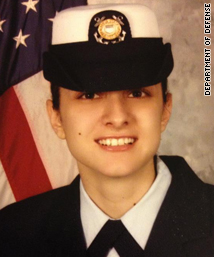
Rape victims say military labels them 'crazy'
(CNN) -- Stephanie Schroeder joined the U.S. Marine Corps not long after 9/11. She was a 21-year-old with an associate's degree when she reported for boot camp at Parris Island, South Carolina.
"I felt like it was the right thing to do," Schroeder recalls.
A year and a half later, the Marines diagnosed her with a personality disorder and deemed her psychologically unfit for the Corps.

Anna Moore enlisted in the Army after 9/11 and planned to make a career of it. Moore was a Patriot missile battery operator in Germany when she was diagnosed with a personality disorder and dismissed from the Army.
Jenny McClendon was serving as a sonar operator on a Navy destroyer when she received her personality disorder diagnosis.
These women joined different branches of the military but they share a common experience:
Each received the psychiatric diagnosis and military discharge after reporting a sexual assault.
Stephanie Schroeder
"I'm not crazy," says Schroeder, who is married now, with two daughters. "I am actually relatively normal."
McClendon says she had a similar reaction.
"I remember thinking this is absurd; this is ridiculous. How could I be emotionally unstable? I'm very clear of mind, especially considering what had happened." McClendon says. "It was a ludicrous diagnosis."
A similar pattern
CNN has interviewed women in all branches of the armed forces, including the Coast Guard, who tell stories that follow a similar pattern -- a sexual assault, a command dismissive of the allegations and a psychiatric discharge.

Schroeder says a fellow Marine followed her to the bathroom in April 2002. She says he then punched her, ripped off her pants and raped her. When she reported what happened, a non-commissioned officer dismissed the allegation, saying, "'Don't come bitching to me because you had sex and changed your mind,'" Schroeder recalls.
Moore says she was alone in her barracks in October 2002 when a non-commissioned officer from another battery tried to rape her. When she filled out forms to report it, she says, her first sergeant, told her: "Forget about it. It never happened," and tore up the paperwork.
"It felt like a punch in the gut," Moore says. "I couldn't trust my chain of command to ever back me up."
McClendon says she was aboard a Navy destroyer at sea when a superior raped her on the midnight to 2 a.m. watch. After reporting the attack, she was diagnosed with a personality disorder and deemed unfit to serve.
"I was good enough to suit up and show up and serve, but I wasn't good enough after the fact," McClendon says.
Despite the Defense Department's "zero tolerance" policy, there were 3,191 military sexual assaults reported in 2011. Given that most sexual assaults are not reported, the Pentagon estimates the actual number was probably closer to 19,000.
U.S. Defense Secretary Leon Panetta
"The number of sexual assaults in the military is unacceptable," Defense Secretary Leon Panetta said at a news conference in January. "Our men and women in uniform put their lives on the line every day to keep America safe. We have a moral duty to keep them safe from those who would attack their dignity and their honor."
Related: Military sex assault complaints have leveled off
Transcript: Panetta condemns military sexual assaults
But Anu Bhagwati, a former company commander in the Marines and executive director of Service Women's Action Network, a veterans advocacy group, says she sees a pattern of the military using psychiatric diagnoses to get rid of women who report sexual assaults.
"It's convenient to sweep this under the rug. It's also extremely convenient to slap a false diagnosis on a young woman ... and then just get rid of them so you don't have to deal with that problem in your unit. And, unfortunately, a lot of sexual assault survivors are considered problems," Bhagwati says.
From 2001 to 2010, the military discharged more than 31,000 service members because of personality disorder, according to documents obtained under a Freedom of Information Act request by the Vietnam Veterans of America.
Asked by CNN how many of these cases involved sexual assault cases, the Defense Department says it does not keep such figures, nor would the Pentagon comment on individual cases.
The diagnoses
The latest edition of the Diagnostic and Statistical Manual of Mental Disorders, known as the DSM-IV, defines a personality disorder as a long-standing, inflexible pattern of maladaptive behavior and coping, beginning in adolescence or early adulthood.

That would mean women like Schroeder, Moore and McClendon had a pre-existing personality disorder when they joined the military. Someone with personality disorder tends to get fired from jobs, get in trouble with the law or at school or is unable to maintain relationships.
"It makes absolutely no sense medically for people to be diagnosed all of a sudden after being sexually assaulted as an adult in the military to say 'No, you've had this all along,'" says Bhagwati, of the Service Women's Action Network.
"These women have clearly been able to function. They've made it through basic training. They've made it through all the follow-on training. Many of them are deployed overseas in war, and they've done fine there. But, when they're sexually assaulted, and then report it, it seems very suspicious that the military would suddenly stamp them with a pre-existing condition that bars them from serving anymore."
Dr. Liza H. Gold, a clinical professor of psychiatry at Georgetown University School of Medicine, says it's a rule of thumb among psychiatrists not to diagnose someone with a personality disorder in the middle of a traumatic experience like a divorce, litigation or the aftermath of a sexual assault.
The DSM-IV says: "When personality changes emerge and persist after an individual has been exposed to extreme stress, a diagnosis of Post Traumatic Stress Disorder should be considered."
Also, by definition, a personality disorder diagnosis cannot be caused by another psychiatric condition, such as Post Traumatic Stress Disorder, Gold says.
In 2003, when she returned to Germany from a deployment in Israel, Moore says a new Army counselor changed her diagnosis from severe depression to borderline personality disorder after only a half-hour session.
Gold is not familiar with Moore's case, but she says a personality disorder was not a diagnosis that typically could be made quickly.
The numbers
Military records show the personality disorder diagnosis is being used disproportionately on women, according to military records obtained by Yale Law School's Veterans Legal Services Clinic under a Freedom of Information Act request.
--In the Army, 16% of all soldiers are women, but females constitute 24% of all personality disorder discharges.
--Air Force: women make up 21% of the ranks and 35% of personality disorder discharges.
--Navy: 17% of sailors are women and 26% of personality disorder discharges
--Marines: 7% of the Corps and 14% of personality disorder discharges
The records don't reflect how many of those women had reported sexual assault.
The cost
A personality diagnosis discharge can carry a heavy financial burden.
In the military's eyes, a personality disorder diagnosis is a pre-existing condition and does not constitute a service-related disability. That means sexual assault victims with personality disorder discharges don't receive benefits from the Department of Veterans Affairs to help with their trauma. They can still apply for benefits, but it's considered an uphill battle.
There are other costs. For example, members of the armed forces who receive a personality disorder discharge lose education benefits under the GI Bill.
Moore, now 32 and married, says the Army came after her for $2,800 of the enlistment bonus she received when she signed up for six years. With interest and penalties, the bill topped $6,000. Moore says she's still paying it off.

Celeste Santana, a former Navy lieutenant commander, lost her pension when she was involuntarily separated from the military in 2011 after 17 years of active duty -- three years short of being eligible to retire. Santana says the Navy gave her an adjustment disorder after she reported being sexual assaulted in the middle of the night at a forward operating base in Helmand Province, Afghanistan. She says no medical evaluation ever took place.
An adjustment disorder is an excessive response to a stressful experience, typically lasting three to six months. For example, Gold says, someone who is fired from a job, stops eating, refuses to get out of bed and won't talk to anyone might be suffering from an adjustment disorder.
Secondary injury
Veterans who talked to CNN all say lack of military response to their reports of assault added to their emotional trauma. Gold says therapists call this a "secondary injury." McClendon, Moore and Schroeder each say they became suicidal.
Panayiota Bertzikis received an adjustment disorder diagnosis and was forced out of the Coast Guard in 2006 -- after reporting to her superiors that she had been punched in the face and raped by a shipmate during an off-duty hike.
When she reported the attack, Bertzikis says the chief of her Coast Guard station ordered her and her attacker to clean out an attic on base together and told to work out their differences.
"I am the victim of this crime, and then you report it, and then I felt like I was the one on trial -- I was the one who did something wrong," Bertzikis says. "He got a free pass. I was the one fighting to stay in."
Bhagwati, who runs the Service Women's Action Network, says the sense of betrayal is profound for sexual assault victims whose allegations are not taken seriously.
"Very commonly victims will hear that they're lying whores. It's very common," Bhagwati says. "That kind of betrayal deepens the trauma so, so much, and it's hard to recover from that. I mean, it's akin to incest where you grow up with a family, with someone you trust, admire and in many cases, salute, is your perpetrator. It's a huge betrayal that often entails guilt, embarrassment, shame. You're made to feel that you did something wrong and you could have prevented it from happening."

In the civilian world, sexual assault victims can quit their jobs, go to court, go to the media, says J.D. Hamel, a Marine veteran and Yale Law student involved at the Veterans Legal Services Clinic. If higher-ups don't follow-up on allegations, Hamel explains, there is no other recourse.
"If the command doesn't deal with it, no one is going to deal with it," he says. "It's just a very lonely position to be in. It's hard for people who have never been in the military to realize how all-encompassing military life is."
Rep. Jackie Speier, D-California, says the military has used personality and other psychiatric diagnoses "almost robotically" to force women who report sexual assaults out of the service.
"It's the default position the military uses," says Speier, a member of the House Armed Services Committee. "The problem we have in the military is the unit commander is in charge of the entire process."
Speier has introduced legislation that would take sexual assault cases out of the chain of command and assign them to an autonomous office at the Pentagon.
Bhagwati says victims of sexual assault in the military should be able to sue for damages in civil court.
Anu Bhagwati, Service Women's Action Network
"Until there's a deterrent, you're going to have far too much incentive to the average commander, to the average perpetrator, to do the wrong thing," she says. "It's far too convenient to do the wrong thing now."
Military response
The Pentagon has made changes in policy on personality disorder diagnoses and discharges.
Army guidelines enacted in 2008 require commanders to review administrative separations, such as personality and adjustment disorder discharges, for sexual assault victims. The commander must assess whether the separation "appears to be in retaliation" for reporting the sexual assault or involves a medical condition like Post Traumatic Stress Disorder.
After congressional hearings in 2008 looking into Afghanistan and Iraq combat veterans who received personality discharges, the Pentagon also changed the rules to require a psychiatrist or PhD-level psychologist to diagnose personality disorder on troops who "served or are currently serving in imminent danger pay areas."
The new rules require personality disorder diagnoses for combat veterans to be corroborated a by a peer or higher-level mental health professional and endorsed by the surgeon general of the relevant military branch. This added layer of protection against misdiagnoses does not affect sexual assault victims.

Bertzikis started blogging about her case and says she found other women -- and some men -- who described similar experiences. She has started two websites: stopmilitaryrape.org and mydutytospeak.com, a chance for victims of military sexual assault to share their stories.
"For me, writing has been very helpful," Bertzikis says.
At his January news conference, Secretary Panetta announced that for the first time service members who reported a sexual assault would be allowed to make an immediate request to transfer to a different unit. The commanding officer would then have 72 hours to decide whether to grant the request.
Panetta also ordered an assessment of the training that commanding officers and senior enlisted personnel receive on sexual assault prevention and response. That report is scheduled to be completed next month.
Moore and Schroeder each say they'd still be in the military if the military had aggressively pursued their attackers and allowed them to switch units. But Schroeder is skeptical about the Pentagon's efforts.
"It's all just talk. It's for show," Schroeder says.
Bertzikis started and runs the Military Rape Crisis Center, which helps victims of sexual assault in the military. She and Schroeder have joined a lawsuit suing the Defense Department for unspecified monetary damages for a culture that permitted sexual assaults.
Asked by CNN about the lawsuit, the Defense Department says it does not comment on pending litigation.
Anna Moore
As for the personality and adjustment disorder discharges, the Pentagon tells CNN: "We encourage all separating service members who believe their discharges were incorrectly characterized or processed to request adjudication through their respective military department's Discharge Review Board and Board for Correction of Military Records."
McClendon, 41, is married and the mother of four. She teaches college humanities courses. Two or three times a week, she says she's awakened by nightmares.
Schroeder, 30, is getting a business degree and taking care of her daughters, who are in second and third grade. She says she suffers from anxiety and depression and is fighting the Department of Veterans Affairs for a PTSD diagnosis.
Moore, 32, received a diagnosis of PTSD from the Veterans Affairs and is on full disability.
"I have nightmares all the time and flashbacks and things like that," Moore says. "I'm still paranoid of the outside world and how cruel people can be -- because what my chain of command did to me was cruel and unnecessary."
CNN's Jonathan Binder and Sean O'Key contributed to this report.
VIEW ALL VIDEOS
http://www.cnn.com/2012/04/14/health/military-sexual-assaults-personality-disorder/index.html
